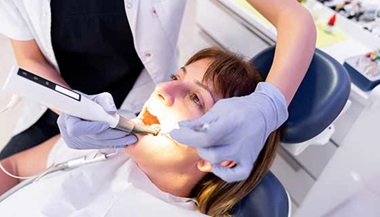Sensitive Teeth: Why They Hurt and How to Stop the Pain
Reviewed By:
Tooth sensitivity, also known as dentin hypersensitivity, is a common dental problem characterized by sharp, temporary pain or discomfort in one or more teeth when exposed to certain stimuli. These stimuli can include hot or cold temperatures, sweet or acidic foods and drinks, or even brushing and flossing.
If you’ve ever felt sudden tooth discomfort after eating something hot or cold, you may have sensitive teeth. This occurs when the underlying layer of your teeth (dentin) becomes exposed. Alexander K. Daniel, D.D.S. of Johns Hopkins Oral and Maxillofacial Surgery and Dentistry, reviews what people should know.
What You Need to Know
- Sensitive teeth are quite common.
- Frequent discomfort in your teeth while eating, drinking or exposing your mouth to hot and cold elements is a sign of tooth sensitivity.
- Treatment for sensitive teeth varies depending on the cause.
Why are my teeth sensitive?
The causes of sensitive teeth could depend on many factors, including:
- Brushing too hard
- Cracked teeth
- Recent dental procedures
- The use of products to whiten or bleach teeth
- Gum recession and/or gum disease
- Acidic foods
- Age
- Plaque buildup
- Teeth grinding
- A temporomandibular disorder (TMD) of the jaw muscles, temporomandibular joints and/or nerves associated with chronic facial pain
Tooth Sensitivity Treatment
Several treatments are available for tooth sensitivity, depending on the underlying cause and severity of the condition. Some common treatments include:
- Desensitizing toothpaste: There are several brands of toothpaste to help combat sensitive teeth. You may need to try different brands to find what works best for you.
- Dental bonding or sealants: If tooth sensitivity is caused by exposed dentin due to receding gums or enamel erosion, your dentist may recommend applying dental bonding or sealants to cover and protect the exposed surfaces.
- Fluoride: Fluoride helps further strengthen your tooth enamel and overcome tooth sensitivity.
- Mouthguard: Constant clenching and grinding of the teeth wears away tooth enamel. Adding a mouthguard can help limit the stress put on your teeth.
- Root canal therapy: In severe cases of tooth sensitivity, if the nerve inside the tooth is affected, root canal therapy may be necessary to remove the damaged nerve tissue and alleviate the sensitivity.
- Lifestyle changes: Making changes to your oral hygiene routine, such as using a soft-bristled toothbrush and avoiding abrasive toothpaste or aggressive brushing techniques, can help reduce sensitivity. Additionally, avoiding acidic foods and drinks, quitting smoking, and addressing teeth grinding or clenching habits can also help improve sensitivity.
It’s important to consult with a dentist to determine the underlying cause of your tooth sensitivity and to discuss the most appropriate treatment options for your specific situation.
Tooth Sensitivity Prevention
Taking care of your tooth enamel is key to preventing sensitive teeth. Tooth enamel is the hard outer layer that protects your teeth. To prevent or minimize tooth enamel damage:
- Follow good oral hygiene: Following proper brushing and flossing guidelines will help protect your mouth and lessen the chances of tooth sensitivity.
- Don’t brush too hard: Brushing too hard or using a hard-bristle toothbrush will lead to further tooth enamel erosion.
- Use fluoride products: Fluoride can strengthen tooth enamel and help protect against sensitivity. Use fluoride toothpaste, and consider using a fluoride mouthwash or receiving professional fluoride treatments from your dentist.
- Avoid acidic foods: Frequent consumption of acidic foods can reduce tooth enamel and lead to dentin exposure, causing tooth sensitivity.
- Unclench your teeth: Teeth grinding and clenching lead to enamel wear and dentin exposure.
- Address dental issues promptly: If you have cavities, cracked teeth or gum disease, seek treatment from your dentist as soon as possible. These dental problems can contribute to tooth sensitivity if left untreated.
Oral and Maxillofacial Surgery and Dentistry
Our team of dental health experts and oral surgeons offers comprehensive services, including general dentistry, cosmetic procedures, oral and jaw surgery, as well as tooth implants and jaw prosthetics.







